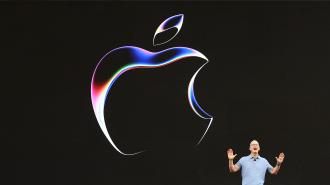Tech giant Apple has developed its own version of ChatGPT, according to a report from Bloomberg — but its plans for bringing generative AI to customers are still unknown, even to insiders.
The background: Generative AI is a kind of machine learning which trains software to create new content in response to user prompts — depending on the AI, this might mean new text, images, audio, video, or even computer code.
Seemingly every company except Apple has been trying to capitalize on generative AI.
While the field isn’t new, it wasn’t until 2022 that generative AI really captured the public attention, thanks in huge part to OpenAI’s impressive image-generating DALL-E 2, followed by its text-generating ChatGPT, which became the fastest growing app in history.
Since then, Google, Microsoft, and seemingly every other company has been trying to capitalize on generative AI, with huge investments into the tech and regular announcements about how it’s being integrated into consumer products.
The hold out: Apple has been the major exception to this trend.
Despite being the biggest tech company in the world, it has had remarkably little to say about generative AI in the past year, and speculation that it was waiting until its annual Worldwide Developer Conference in June to drop some major AI news turned out to be unwarranted. Apple stuck with its plan to focus on its new VR headset.
Apple has reportedly developed “Apple GPT,” but doesn’t currently plan to release the chatbot.
Apple GPT: Apple might not be saying much about generative AI, yet, but it is putting significant effort into figuring out how to integrate the tech into its products, people with knowledge of the work told Bloomberg.
Bloomberg’s sources say Apple has developed “Ajax,” a framework for creating “large language models” — the types of neural networks behind ChatGPT and Google’s Bard. It’s also used Ajax to create a chatbot some of its engineers refer to as “Apple GPT.”
This chatbot is now available to certain Apple employees, with special approval, but according to Bloomberg’s report, there’s nothing particularly unique about the AI — it’s essentially just filling the void created when Apple restricted employees’ internal use of other chatbots due to privacy and security concerns — and Apple doesn’t currently plan to release it to consumers.
“I do think it’s very important to be deliberate and thoughtful in how you approach these things.”
Tim Cook
Looking ahead: While Apple does have multiple teams working on generative AI, it still hasn’t decided how to incorporate the technology into its products or address the myriad other concerns (such as privacy, bias, misinformation, and more) involving the tech, according to Bloomberg’s sources.
They expect it won’t be ready to make a “significant AI-related announcement” until 2024, which aligns with CEO Tim Cook’s commitment to incorporating generative AI into his company’s products only after analyzing all angles — even if it means being the only company not rolling out products with the tech for a while.
“I do think it’s very important to be deliberate and thoughtful in how you approach these things,” he said during an earnings call in May. “And there’s a number of issues that need to be sorted … but the potential is certainly very interesting.”
We’d love to hear from you! If you have a comment about this article or if you have a tip for a future Freethink story, please email us at [email protected].






